Select Works of Moses Maimonides (5 vols.)
Digital Logos Edition
Overview
Moses Maimonides was one of the most influential writers in Jewish history. Highly educated, he was forced to quit school and become a doctor when his brother died while traveling with the majority of their family’s wealth. Maimonides quickly established himself as one of the best doctors in Egypt, eventually becoming the personal physician to the sultan. As the sultan’s physician, Maimonides was responsible for looking after his entire house. Maimonides reputation as a skilled doctor left him with a never-ending supply of patients, and time for only a single meal per day. Despite his full-time medical practice, his education left him with a passion for understanding and explaining the deeper questions of theology, Jewish law, and ethics. His theological, philosophical, and ethical writings were well received, and he became the head of the Jewish community in Egypt.
Moses Maimonides is one of the few Jewish theologians whose writings penetrated the non-Jewish world. The Guide for the Perplexed explores philosophical and theological issues that appeal to a wide range of faiths and beliefs about God—the nature of God, the origins of the world, the nature of evil, and more. While his impact across cultures was significant, Maimonides’ philosophy and theology resonated with the Jewish community in ways no other writer could. Over 700 years after his death, countless Jews echoed his 12th statement of faith—“I believe with a full heart in the coming of the Messiah, and even though he may tarry I will still wait for him”—as they were forced into Nazi gas chambers.
The Select Works of Moses Maimonides includes a mix of works by Maimonides himself and works by Jewish Maimonides scholars. The collection contains The Guide for the Perplexed, The Eight Chapters of Maimonides on Ethics, Maimonides’ Treatise on Logic, and two biographies on the life of Moses Maimonides.
In the Logos editions, these valuable volumes are enhanced by amazing functionality. Scripture citations link directly to English translations, and important terms link to dictionaries, encyclopedias, and a wealth of other resources in your digital library. Powerful searches by topic or Scripture reference help you find exactly what you’re looking for. Tablet and mobile apps let you take the discussion with you. With Logos Bible Software, the most efficient and comprehensive research tools are in one place, so you get the most out of your study.
This title is included in the following collections
You can save when you purchase this product as part of a collection.
Philosophy Research Library (1...
$799.99$799.99Verbum 7 Diamond Legacy Librar...
$2,999.99$2,999.99Verbum 7 Portfolio Legacy Libr...
$4,749.99$4,749.99

- One of the most influential Jewish writers
- Multiple biographical texts about the life of Moses Maimonides
- Some of Maimonides most powerful writings on theology, ethics, and law
Maimonides is perhaps the only philosopher in the Middle Ages, perhaps even now, who symbolizes a confluence of four cultures: Greco-Roman, Arab, Jewish, and Western.
—Vitali Naumkin, director, Center for Arab Studies, Institute of Oriental Studies, Russian Academy of Sciences
Maimonides is the most influential Jewish thinker of the Middle Ages, and quite possibly of all time.
—Shlomo Pines in Time magazine
From Moses [of the Torah] to Moses [Maimonides], there was none like Moses.
—Jewish expression from the Middle Ages
- Title: Select Works of Moses Maimonides
- Authors: Moses Maimonides, David Yellin, Israel Abrahams, and Solomon Zeitlin
- Translators: M. Friedländer, Israel Efros, and Joseph I. Gorfinkle
- Volumes: 5
- Pages: 1,226
- The Guide for the Perplexed, 2nd ed. translated by M. Friedländer
- The Eight Chapters of Maimonides on Ethics: A Psychological and Ethical Treatise translated by Joseph I. Gorfinkle
- Maimonides’ Treatise on Logic: The Original Arabic and Three Hebrew Translations translated by Israel Efros
- Maimonides by David Yellin and Israel Abrahams
- Maimonides: A Biography by Solomon Zeitlin
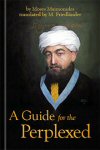
Almost 900 years ago, Moses Maimonides wrote Guide for the Perplexed, addressing some of the most difficult theological and philosophical questions ever asked—questions the world is still asking. Likely written to help a student understand the Merkabah narrative, or the chariot of Ezekiel, Maimonides’ text pushed theology and philosophy to discuss the origins and timeline of the universe, the nature of evil, and intelligent design. The Guide for the Perplexed is divided into three books, examining the nature of God, natural philosophy, creation theories, angels and prophecy, the Merkabah narrative, and the 613 laws of the Pentateuch. Maimonides engaged with Jewish, Islamic, and ancient Greek philosophers to construct this highly influential text, challenging Aristotle and others with scriptural and physical evidence.
M. Friedländer (1833–1910) studied Near and Far Eastern societies and cultures and was principal of Jews’ College in London. His other works include The Jewish Religion, An Essay on the Writings of Ibn Ezra, The Commentary of Abraham Ibn Ezra on Isaiah, and a German commentary on the Song of Songs. He also edited a Jewish Family Bible and contributed articles to the Jewish Quarterly Review.
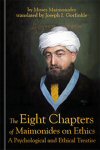
Scholars generally agree that Maimonides’ main intention for his writings on ethics was to unify traditional Jewish belief and Aristotelian philosophy. Highly educated in both realms, Maimonides provided the world with teachings which are still appreciated today. In this translation, Joseph I Gorfinkle introduces valuable insight into Maimonides’ writings.
Contents:
- Chapter I—Concerning the Human Soul and its Faculties
- Chapter II—Concerning the Transgressions of the Faculties of the Soul, and the Designation of those Faculties which are the Seat of the Virtues and Vices
- Chapter III—Concerning the Diseases of the Soul
- Chapter IV—Concerning the Cure of the Disease of the Soul
- Chapter V—Concerning the Application of Man’s Psychic Faculties towards the Attainment of a Single Goal
- Chapter VI—Concerning the Difference between the Saintly or Temperamentally Ethical Man and him who Subdues his Passions and has Self-restraint
- Chapter VII—Concerning the Barrier between God and Man and its Signification
- Chapter VIII—Concerning the Natural Disposition of a Man
- Index of Scriptural Passages
- Index of Quotations From the Talmud
- Critical Text and Notes of the Shemonah Perakim
Joseph I. Gorfinkle was a translator of Hebrew and Arabic.
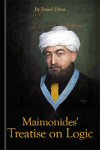
This volume contains Israel Efros’ English translation of Maimonides’ Treatise on Logic, as well as the original Arabic text, the Tibbon version, the Ahitub version, and the Vivas version, with Efros’ textual comments.
Israel Efros (1891–1981) was a rabbi of Temple Beth El from 1929–1935, and professor of semitics at the University of Buffalo from 1935–1941. Efros was a poet, philosopher, and translator.
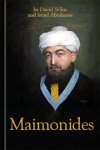
This biography was the joint work of David Yellin and Israel Abrahams. Originally, David Yellin wrote this biography in Hebrew, and rather than translating it into English, Israel Abrahams wrote a fresh biography using Yellin’s work as his basis.
David Yellin (1864–1941) was educated at the Etz Hayim yeshiva. He taught at the Alliance Israelite Universelle school and was the first president of the Teachers Association, a member of the Ottoman parliament, and was one of the first public figures to openly join the Zionist movement. He was exiled in 1917.
Israel Abrahams (1858–1925) was a distinguished Jewish scholar. He received his MA from the University of London, and taught both secular subjects and homiletics at Jews’ College. He wrote a number of works on Judaism, including Jewish Life in the Middle Ages.
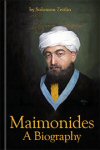
In this volume, Solomon Zeitlin examines the life of Maimonides, giving context for his numerous and diverse works.
Solomon Zeitlin (1886–1876) was a Jewish historian and teacher of Talmud. He taught many rabbis of the Philadelphia. His works include Who Crucified Jesus and The Rise and Fall of the Judean State, which remains the standard history of the Second Jewish Commonwealth, and essential reading for those studying the origins of Christianity.
Moses Maimonides (1135–1204) was a rabbi, physician, and philosopher in Morocco and Egypt. His ethical writings on Jewish law establish him as one of the most influential rabbis and philosophers in Jewish history. Today, his writings are still widely regarded as authoritative texts. His other works include a number of medical treatises, Commentary on the Mishna, and the Mishneh Torah.
Reviews
5 ratings
Avril Russell
3/2/2021

Elizabeth Parker
11/7/2016
AeliusCicero
6/19/2014

Larry Proffitt (I
4/29/2014
Albert Cooper
4/25/2014